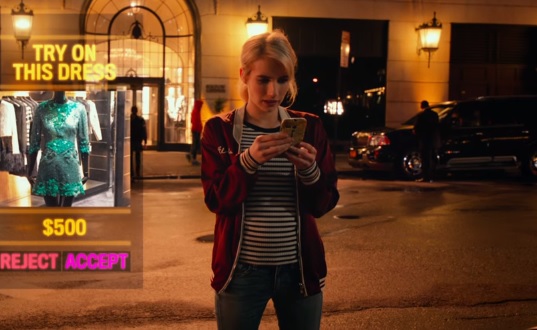
Ian (Dave Franco) invites Vee (Emma Roberts) to continue the ride in NERVE.
Nerve is set in the current modern digital age, where teenage millennials live in an open-source world of access and exposure. A graduating senior, Venus (Emma Roberts, whose character goes by “Vee”) is struggling with some life choices: should she go to the expensive colleges of her dream on the west coast, and should she finally tell the star quarterback (J.P, played by Brian Marc) that she’s always had a crush on him? Best friend Sydney (Emily Meade) decides Vee is too reserved and not taking enough chances, and thus speaks to J.P. on her behalf, only to end up with Vee receiving a small shower of public humiliation.
These events lead Vee to do something brash—join an online game called Nerve which Sydney recently started played. The game, as the cryptic rules announcer states, is rather simple. There are players and watchers. Players must compete dares of increasing risk for cash, while watchers boost their favorite participants through view counts. When Vee unexpectedly gets paired with Ian (Dave Franco), the two decide to work together to make more money. However, as the stakes get higher, Vee discovers that playing Nerve may be far more dangerous than anyone thought.

What Nerve gets right is the suspense and basic chemistry of the characters. The escalation of dares throughout Nerve is interesting (if not genuinely funny) to start, with a slow burn to really crazy and eventually downright hazardous. For example, early dares might include kissing a stranger, pretending to pass gas in public, or trying on expensive clothing. Nerve does a good job of ramping up the intensity gradually, making some of the sequences truly thrilling, successfully mimicking the appeal of the voyeuristic in-movie online game at the center of the plot.
Vee and Ian are extremely enjoyable together, and their interactions help keep Nerve engaging. They complement each other well with Vee’s innocent intelligence syncing with Ian’s fearless charm. Ian is the player excitedly rushing into the challenge, while the more reluctant Vee formulates and executes the plan. If not for these well-designed characters, Nerve would completely falter and fall into an inability to suspend belief. 
While Nerve boasts a pair of interesting leads executing on an intriguing premise, the central plot has the unfortunate issue of not knowing how to resolve itself. Nerve wants to push the boundaries and raise questions about how far people are willing to go for money, and what our society would be willing to watch from the comfort of anonymity. While these are indeed worthy moral topics to explore in our age of interconnectivity, Nerve simply doesn’t have enough time to address all of the issues and conclude within the length of the film.
Audiences may find Nerve’s ending contrite and dissatisfying. The whole affair builds extremely well, but in the third act, Nerve finds itself spread too thin with characters and plot lines and unfortunately has to rush to the finish line. Convenience without explanation becomes the standard, which only creates more questions than answers. The end result makes one wonder if the original plans for this novel adaptation was a series of a films—a dare the producers were unwilling to accept, but would have likely yielded a stronger product.
In the end, Nerve offers some quality entertainment layer on top of a strong concept, but it lacks the runtime to successfully deliver a cohesive film.
Grade: C+
Photos courtesy of Lionsgate